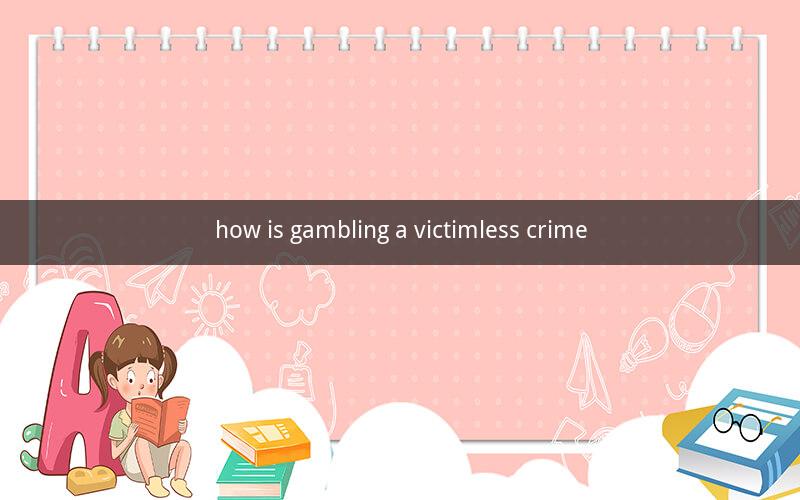
Table of Contents
1. Introduction to the Concept of Victimless Crime
2. The Definition of Gambling
3. The Argument for Gambling as a Victimless Crime
3.1 Economic Benefits
3.2 Personal Choice
3.3 Lack of Direct Harm
4. The Counterarguments Against Gambling as a Victimless Crime
4.1 Social Costs
4.2 Personal and Family Impact
4.3 Potential for Addiction
5. The Role of Government in Regulating Gambling
6. Conclusion
1. Introduction to the Concept of Victimless Crime
The concept of victimless crime has sparked debate among legal scholars, criminologists, and policymakers for decades. This theory posits that certain activities, such as gambling, are not inherently harmful and do not cause direct harm to individuals or society. Consequently, these activities should not be subject to criminal penalties. This essay explores the argument that gambling is a victimless crime and examines the counterarguments against this perspective.
2. The Definition of Gambling
Gambling refers to the act of betting money or something of value on an event with an uncertain outcome, with the primary intent of winning additional money or material goods. It encompasses various forms, including casino games, sports betting, lottery tickets, and online gambling.
3. The Argument for Gambling as a Victimless Crime
Several arguments support the claim that gambling is a victimless crime.
3.1 Economic Benefits
Gambling generates significant revenue for governments, which can be used to fund public services, infrastructure, and social programs. For example, in 2020, the global gambling market was valued at approximately $594.8 billion. This revenue can contribute to economic growth and create jobs in the gambling industry.
3.2 Personal Choice
Advocates argue that gambling is a personal choice and that individuals should have the freedom to engage in activities they enjoy, as long as they do not harm others. They believe that adults should be responsible for their actions and that gambling is a form of entertainment that can be enjoyed in moderation.
3.3 Lack of Direct Harm
The argument that gambling is a victimless crime is based on the premise that it does not cause direct harm to individuals or society. While some individuals may experience negative consequences from gambling, such as financial loss or addiction, these issues are considered personal rather than criminal matters.
4. The Counterarguments Against Gambling as a Victimless Crime
Despite the arguments supporting the victimless nature of gambling, several counterarguments challenge this perspective.
4.1 Social Costs
Critics argue that gambling has significant social costs, including increased crime rates, problem gambling, and financial hardship. For example, a study by the National Council on Problem Gambling found that problem gambling affects approximately 2% of the U.S. adult population, resulting in $7.7 billion in costs each year.
4.2 Personal and Family Impact
Gambling can have devastating consequences for individuals and their families. Problem gamblers may experience financial ruin, marital problems, and mental health issues. The stress and anxiety caused by gambling can also have a negative impact on family members and friends.
4.3 Potential for Addiction
Gambling is a highly addictive activity, and some individuals may develop gambling addiction, leading to significant harm. The potential for addiction makes it difficult to argue that gambling is a victimless crime.
5. The Role of Government in Regulating Gambling
Governments play a crucial role in regulating the gambling industry to minimize its negative consequences. This includes implementing strict licensing requirements, ensuring fair play, and providing resources for individuals struggling with problem gambling. By regulating the industry, governments can protect individuals and society from the potential harm associated with gambling.
6. Conclusion
The debate over whether gambling is a victimless crime is complex and multifaceted. While some argue that gambling is a personal choice with economic benefits, others contend that it has significant social costs and can lead to addiction and harm. Ultimately, the question of whether gambling is a victimless crime depends on one's perspective and values.
Questions and Answers
1. What is the global gambling market valued at?
- The global gambling market was valued at approximately $594.8 billion in 2020.
2. What are the social costs associated with gambling?
- Social costs include increased crime rates, problem gambling, and financial hardship.
3. What is the percentage of the U.S. adult population affected by problem gambling?
- Approximately 2% of the U.S. adult population is affected by problem gambling.
4. What is the role of government in regulating gambling?
- Governments play a crucial role in regulating the gambling industry to minimize its negative consequences.
5. What are some of the potential consequences of gambling addiction?
- Potential consequences include financial ruin, marital problems, and mental health issues.
6. What is the definition of gambling?
- Gambling refers to the act of betting money or something of value on an event with an uncertain outcome.
7. What are some forms of gambling?
- Forms of gambling include casino games, sports betting, lottery tickets, and online gambling.
8. How can governments protect individuals and society from the potential harm associated with gambling?
- Governments can protect individuals and society by implementing strict licensing requirements, ensuring fair play, and providing resources for individuals struggling with problem gambling.
9. What are some of the arguments supporting the victimless nature of gambling?
- Arguments supporting the victimless nature of gambling include economic benefits, personal choice, and the lack of direct harm to individuals or society.
10. What are some of the counterarguments against gambling as a victimless crime?
- Counterarguments against gambling as a victimless crime include social costs, personal and family impact, and the potential for addiction.